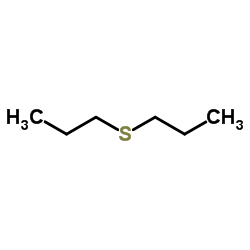二丙基硫醚
一般危化品

二丙基硫醚结构式
|
常用名 | 二丙基硫醚 | 英文名 | Propyl sulfide |
|---|---|---|---|---|
| CAS号 | 111-47-7 | 分子量 | 118.240 | |
| 密度 | 0.8±0.1 g/cm3 | 沸点 | 144.4±8.0 °C at 760 mmHg | |
| 分子式 | C6H14S | 熔点 | −103 °C(lit.) | |
| MSDS | 中文版 美版 | 闪点 | 28.3±0.0 °C | |
| 符号 |


GHS02, GHS07 |
信号词 | Warning |
|
Effects of oil-soluble organosulfur compounds from garlic on doxorubicin-induced lipid peroxidation.
Anticancer Drugs 9(3) , 291-4, (1998) Clinical efficacy of doxorubicin is compromised due to free radical generation leading to cardiac toxicity. Oil-soluble organosulfur compounds, diallyl sulfide (DAS), diallyl disulfide (DADS), dipropyl sulfide (DPS) and dipropyl disulfide (DPDS), present in g... |
|
|
Modulation of phase II enzymes by organosulfur compounds from allium vegetables in rat tissues.
Toxicol. Appl. Pharmacol. 154(1) , 50-8, (1999) The naturally occurring organosulfur compounds (OSCs) diallyl sulfide (DAS), diallyl disulfide (DADS), dipropyl sulfide (DPS), and dipropyl disulfide (DPDS) were studied with respect to their effects on hepatic, intestinal, renal, and pulmonary phase II drug ... |
|
|
Induction of glutathione S-transferase pi as a bioassay for the evaluation of potency of inhibitors of benzo(a)pyrene-induced cancer in a murine model.
Int. J. Cancer 73(6) , 897-902, (1997) There is a growing need for short-term and cost-effective bioassay to assess the efficacy of potential chemo-preventive agents. We report that the induction of glutathione (GSH) S-transferase pi (mGSTP1-1) by a chemo-preventive agent can be used as a reliable... |
|
|
Mechanism of differential efficacy of garlic organosulfides in preventing benzo(a)pyrene-induced cancer in mice.
Cancer Lett. 118(1) , 61-7, (1997) The mechanism of differential efficacies of diallyl sulfide (DAS), diallyl disulfide (DADS), diallyl trisulfide (DATS), dipropyl sulfide (DPS) and dipropyl disulfide (DPDS) in preventing benzo(a)pyrene (BP)-induced cancer in mice has been investigated by dete... |
|
|
Modification of hepatic drug-metabolizing enzymes in rats treated with alkyl sulfides.
Cancer Lett. 120(2) , 195-201, (1997) Natural compounds which elevate detoxification enzymes and/or reduce activating enzymes could be considered as good candidates to protect against cancer. In this work, we studied the modulation of hepatic drug-metabolizing enzymes in rats treated with dimethy... |
|
|
Antimutagenic activity of organosulfur compounds from Allium is associated with phase II enzyme induction.
Mutat. Res. 495(1-2) , 135-45, (2001) In a previous study, we showed that naturally occurring organosulfur compounds (OSCs) from garlic and onion modulated the activation of carcinogen via the alteration of cytochromes P450. The present study was undertaken to determine the incidence of the in vi... |
|
|
Relative activities of organosulfur compounds derived from onions and garlic in increasing tissue activities of quinone reductase and glutathione transferase in rat tissues.
Nutr. Cancer 40(2) , 205-10, (2001) There is evidence that onions and garlic protect against cancer in humans. It has been suggested that this effect is due to the organosulfur compounds in these vegetables and that these substances act through induction of phase II detoxification enzymes. In t... |
|
|
Differential induction of NAD(P)H:quinone oxidoreductase by anti-carcinogenic organosulfides from garlic.
Biochem. Biophys. Res. Commun. 244(3) , 917-20, (1998) This study was undertaken to elucidate the mechanism of organ specificity and differential efficacy of garlic organosulfides (OSCs) [diallyl sulfide (DAS), diallyl disulfide (DADS), diallyl trisulfide (DATS), dipropyl sulfide (DPS) and dipropyl disulfide (DPD... |
|
|
Liver subcellular fractions from rats treated by organosulfur compounds from Allium modulate mutagen activation.
Mutat. Res. 466(1) , 17-26, (2000) The effects of in vivo administration of naturally occurring organosulfur compounds (OSCs) from Allium species were studied on the activation of several mutagens. Male SPF Wistar rats were given p.o. one of either diallyl sulfide (DAS), diallyl disulfide (DAD... |
|
|
Stable and durable CH3NH3PbI3 perovskite solar cells at ambient conditions.
Nanotechnology 27 , 235404, (2016) Degradation of metal-organic halide perovskites when exposed to ambient conditions is a crucial issue that needs to be addressed for commercial viability of perovskite solar cells (PSCs). Here, a concept of encapsulating CH3NH3PbI3 perovskite crystals with a ... |